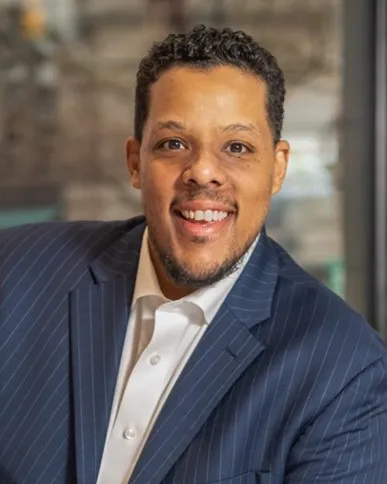A first-in-the-nation pilot to guarantee workers $50,000 salaries is coming soon to Cleveland, one of the poorest cities in the U.S., according to federal data.
The Cleveland City Council earlier this month approved $600,000 for the research and design of the universal basic employment program. Slated to launch in 2026, the pilot will partner with local and small businesses to provide 100 workers in a single neighborhood with a guaranteed salary of $50,000, plus benefits, for three years.
“People that work in delis, turn over beds in hotels — these are real jobs, and, therefore, they should be paid as such,” said Devin Cotten, founder and CEO of the Universal Basic Employment & Opportunity initiative, adding that the pilot could also include workers such as home health aides, state-tested nursing assistants and child-care workers. Beyond the city’s contribution, philanthropy, private donors and investors will financially support the pilot, which will subsidize the salaries of people currently working as well as provide jobs for currently unemployed people, Cotten said.
“Our goal is to bridge folks past the benefits cliff,” — when a person gets a small income increase but loses eligibility for public benefits — “but it's also to stand up the reality of dignifying historically low-wage work,” Cotten said.

Supporters say the idea is that guaranteeing people jobs that pay enough is a better investment than social safety net programs, which currently cost U.S. governments billions of dollars. At the same time, it provides documentation of steady employment, something people living in poverty need to access private-sector resources such as credit cards, mortgages and loans.
This approach differs from universal basic income, which provides low-income residents regular cash payments with no strings attached and has been piloted in dozens of U.S. communities.
Smart Cities Dive spoke with Cotten to understand the vision for the Cleveland pilot and his hopes to bring universal basic employment to the state and federal levels.
This interview has been edited for clarity and length.
SMART CITIES DIVE: What’s this idea’s origin?
DEVIN COTTEN: Early on in my personal life, I realized that my parents' income was the most statistically significant variable in my life. … My parents' resources in the system, their social capital and financial capital put around me, allowed me to bowl with bumpers and be guaranteed to knock down some pins.
Spending almost seven years in community development, I learned what a subsidy was. … Our government has subsidized literally everything — roadways, businesses, innovation — but we fail to subsidize individual agency and prosperity for the nearly 40 million Americans currently living in poverty and so many others who are currently experiencing being part of the working poor.
What is the latest on the Cleveland pilot?
We are going through the process of figuring out which neighborhood is best for us to hone the pilot in on. Our goal of being in a single neighborhood or corridor is because we want to see what the impact looks like on people, place and business. Could we see impacts on community engagement? Could we see youth gun violence and crime go down? … Do we see impacts on educational attainment? Do more people show up to community meetings? Do more people cut their grass? Do we see folks go from nonvoters to voters? We want to see this triple bottom line.
What do you envision universal basic employment looking like on a larger scale?
We're running with a true North Star of state and federal policy. ... We know that what we're building here is the first piece of literature in a larger movement to create better economic guarantees. ... Our long-term goal is to run multiple pilots across the country.
What are the challenges of standing up this program?
Bridging folks past the use of social safety net benefits is something that we're taking very seriously because it's really hard. ... It’s why we put so much intense case management support around the pilot.
[Another] challenge is ensuring we're keeping people's voices centered and business owners centered to ensure that the pilot does no harm, but also ensure that people are at the center of this policy solution.
Some have cited concerns that UBE could drive down wages from employers who can rely on the government to subsidize the cost for them. How do you respond to that?
A lot of times when people talk about “Is this going to drive wages down?” it’s because they don't necessarily truly understand the mechanism. If the government comes in and subsidizes the minimum salary at some level at $50,000 — and that's for an individual that has low employment history, lack of soft and hard technical skills, could have a felonious background — if that individual is making $50,000, an individual that has a higher level of output, more employable skills or more demonstrated work history [in comparison], now there's there's already a fierce competition for talent and employees. Now, how are you competing in the marketplace?
So this is the new floor. Actually, wages are going to begin to push up.












